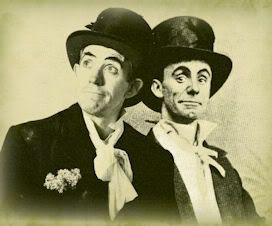
Dan Leno - The King’s Jester
Georgian Theatre Royal Richmond, North Yorkshire, then touring
Getting up having watched a two hour show about 'The Funniest Man on Earth', you will struggle to hold back the tears. And herein lies the beauty of the Georgian Theatre Royal’s Dan Leno – The King’s Jester. It's a fascinating and poignant exploration of the very fine line between comedy and tragedy.
Written and performed by Tony Lidington, this primarily one man show examines the career of Dan Leno, the most famous music hall artist of his age and creator of both the pantomime dame and the concept of ‘stand up’ comedy. The retrospective look at his life's work takes place in the mental asylum where Leno spent his last months. As part of his treatment Leno asks his doctor, played by Malcolm Boyle, if he may perform some of his old routines before an audience. And so the trip down memory lane begins.
Unfortunately, but perhaps predictably, in order to keep up an older memory is required. For a 19 year old, the music hall patter and routines are largely unfunny, and though they are certainly of interest, they don't justify more than a polite giggle. As a whole, the audience is largely unsure in their reaction. Performed in an original Georgian Theatre,with a maximum seating capacity of 200 and the audience less than a metre from the stage, a highly energised atmosphere is created. The audience begins by interacting warmly and openly with Lidington as he presents some of Leno’s most well known routines. But as the play goes on, and Leno’s struggle for recognition by the theatre world becomes both obsessive and aggressive, the audience falters. However, while the quieter responses may at first appear as though the audience are becoming despondent, it may be more that this appearance of Leno's darker side has shaken their preconceptions and left them deeply moved.
Lidington, as Leno, gives a very strong performance in a demanding role. He successfully engages the audience’s attention with this playful, deeply insecure but mesmerizing comedian. Boyle's doctor is wooden and stoic, representing the strait laced Edwardian world determined to clamp down upon the ‘funny little man’. Unfortunately, his presence is, at times, irritating and intrusive.
As the show leaves Richmond, and begins its tour, it will be interesting to see how this intense play adapts to larger venues and whether it will be able to retain its strong audience connection. Regardless of venue size, it is a show that requires you to consider what we laugh at and why. It also allows a funny little man with sad eyes to at last get the theatrical recognition he has so longed for.
Jane Williamson
Georgian Theatre Royal Richmond, North Yorkshire, then touring
Getting up having watched a two hour show about 'The Funniest Man on Earth', you will struggle to hold back the tears. And herein lies the beauty of the Georgian Theatre Royal’s Dan Leno – The King’s Jester. It's a fascinating and poignant exploration of the very fine line between comedy and tragedy.
Written and performed by Tony Lidington, this primarily one man show examines the career of Dan Leno, the most famous music hall artist of his age and creator of both the pantomime dame and the concept of ‘stand up’ comedy. The retrospective look at his life's work takes place in the mental asylum where Leno spent his last months. As part of his treatment Leno asks his doctor, played by Malcolm Boyle, if he may perform some of his old routines before an audience. And so the trip down memory lane begins.
Unfortunately, but perhaps predictably, in order to keep up an older memory is required. For a 19 year old, the music hall patter and routines are largely unfunny, and though they are certainly of interest, they don't justify more than a polite giggle. As a whole, the audience is largely unsure in their reaction. Performed in an original Georgian Theatre,with a maximum seating capacity of 200 and the audience less than a metre from the stage, a highly energised atmosphere is created. The audience begins by interacting warmly and openly with Lidington as he presents some of Leno’s most well known routines. But as the play goes on, and Leno’s struggle for recognition by the theatre world becomes both obsessive and aggressive, the audience falters. However, while the quieter responses may at first appear as though the audience are becoming despondent, it may be more that this appearance of Leno's darker side has shaken their preconceptions and left them deeply moved.
Lidington, as Leno, gives a very strong performance in a demanding role. He successfully engages the audience’s attention with this playful, deeply insecure but mesmerizing comedian. Boyle's doctor is wooden and stoic, representing the strait laced Edwardian world determined to clamp down upon the ‘funny little man’. Unfortunately, his presence is, at times, irritating and intrusive.
As the show leaves Richmond, and begins its tour, it will be interesting to see how this intense play adapts to larger venues and whether it will be able to retain its strong audience connection. Regardless of venue size, it is a show that requires you to consider what we laugh at and why. It also allows a funny little man with sad eyes to at last get the theatrical recognition he has so longed for.
Jane Williamson





No comments:
Post a Comment